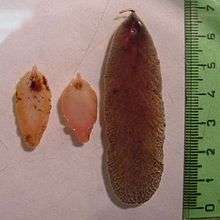Echinostomata
Echinostomata is a suborder of the parasitic flatworm order Plagiorchiida. The suborder contains numerous species that are parasitic in humans.
| Echinostomata | |
|---|---|
 | |
| Adult Common Liver Flukes (Fasciola hepatica, left) and Giant Liver Fluke (Fascioloides magna) of the Fasciolidae | |
| Scientific classification | |
| Kingdom: | Animalia |
| Phylum: | Platyhelminthes |
| Class: | Rhabditophora |
| Order: | Plagiorchiida |
| Suborder: | Echinostomata La Rue, 1926[1] |
Families
All families are in the superfamily Echinostomatoidea Looss, 1902.[2] It has been synonymised with Cyclocoeloidea Stossich, 1902.[3]
- Calycodidae Dollfus, 1929[4]
- Cyclocoelidae Stossich, 1902[3]
- Echinochasmidae Odhner, 1910[5]
- Echinostomatidae Looss, 1899[6]
- Eucotylidae Cohn, 1904[7]
- Fasciolidae Railliet, 1895[8]
- Himasthlidae Odhner, 1910[5]
- Philophthalmidae Looss, 1899[6]
- Psilostomidae Looss, 1900[9]
- Rhytidodidae Odhner, 1926[10]
- Typhlocoelidae Harrah, 1922[11]
gollark: `T(C,5);`
gollark: That can be arranged.
gollark: I'm gollark, beekeeper/alleged rogue for some reason. Apparently my skills include asking people things, bee search, goblin checking, and punching.
gollark: It seems to be missing the lines?
gollark: I really feel like Spirit's insults are more refined than yours.
References
- La Rue, G. R. (1926). Studies on the trematode family Strigeidae (Holostomidae. II. Taxonomy; III. Relationships). Transactions of the American Microscopical Society, 45, 265–280.
- Looss, A. (1902). Die Distomen-Unterfamilie der Haploporinae. Archives de Parasitologie, 6, 129–143.
- Stossich, M. (1902). Monostomum mutabile Zeder e le sue forme affini. Bollettino della Societ’a Adriatica di Scienz Naturali in Trieste, 21, 1–40.
- Dollfus, R. P. (1929). Sur les Tétrarhynques. I. Définition des genres. Bulletin de la Société Zoologique de France, 54, 308–342.
- Odhner, T. (1910). Nordafrikanische Trematoden größtenteils vom weißen Nil. Results of the Swedish zoological expedition to Egypt and the White Nile, 1901, 23A, 1–170.
- Looss, A. (1899). Weitere Beiträge zur Kenntniss der Trematoden-Fauna Aegyptens, zugleich Versuch einer natürlichen Gliederung des Genus Distomum Retzius. Zoologische Jahrbücher, Abteilung für Systematik, Geographie und Biologie der Tiere, 12, 521–784.
- Cohn, L. (1904). Helminthologische Mitteilungen. 2. Archiv für Naturgeschichte, 70, 229–252.
- Railliet, A. (1895). Sur une forme particulière de douve hépatique provenant de Sénégal. Comptes Rendus Hebdomadaires des Séances de la Société de Biologie, Paris, 47, 338–340.
- Looss, A. (1900). Nachträgliche Bemerkungen zu den Namen der von mir vorgeschlagenen Distomidengattungen. Zoologischer Anzeiger, 23, 601–608.
- Odhner, N. H. (1926). Die Opisthobranchien. Further zoological results of the Swedish Antarctic Expedition 1901-1903, under the direction of Dr. Otto Nordenskjöld, 2(1), 1–100.
- Harrah, E. C. (1922). North American monostomes primarily from freshwater hosts. Illinois Biological Monographs, 7, 162–165.
This article is issued from Wikipedia. The text is licensed under Creative Commons - Attribution - Sharealike. Additional terms may apply for the media files.